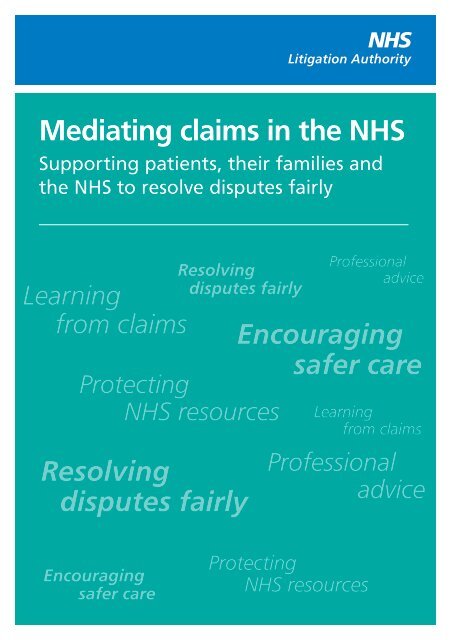Mediation Leaflet
Mediation Leaflet
Mediation Leaflet
You also want an ePaper? Increase the reach of your titles
YUMPU automatically turns print PDFs into web optimized ePapers that Google loves.
Litigation Authority<br />
Mediating claims in the NHS<br />
Supporting patients, their families and<br />
the NHS to resolve disputes fairly
The NHS LA supports mediation as a means of resolving disputes fairly. Its new<br />
mediation service has been designed to support patients, families and NHS staff<br />
in working together towards a solution which may go further than just financial<br />
compensation and avoids the need to go to court.<br />
From July 2014 the NHS LA will offer mediation, in all suitable cases involving<br />
a fatality or elderly care. The service will include access to an independent and<br />
accredited mediator, selected from a panel drawn from a wide range of backgrounds.<br />
What is mediation?<br />
<strong>Mediation</strong> is an independent, voluntary and confidential process in which a trained<br />
neutral helps the parties to resolve their dispute. The mediator’s role is not to take<br />
sides but he or she will often help to test the strength of each side’s position in<br />
private and explore solutions. Legal rights remain intact and if either side is unhappy<br />
with the outcome, the case can still proceed to court. About 75% of mediations<br />
result in a satisfactory outcome, often within a single day.<br />
The benefits of mediation<br />
1 Confidential<br />
2 Voluntary<br />
3 Flexible<br />
4 Can be arranged quickly<br />
5<br />
6<br />
7<br />
8<br />
9 Allows time for reflection<br />
An opportunity for face-to-face discussion if the parties wish<br />
Non-financial outcomes such as apologies or explanations<br />
No need for a formal court process<br />
Non-binding until a written agreement is signed
Litigation Authority<br />
What to expect<br />
• Once the parties agree to mediation, the claimant will be offered the choice of a<br />
mediator from a panel of experienced and accredited individuals from a range of<br />
backgrounds.<br />
• The selected mediator will contact the parties over the telephone to fix a suitable<br />
date and location and to obtain the background information. Information shared<br />
with the mediator is confidential and only disclosed to the other party with prior<br />
agreement.<br />
• On the day of the mediation each side will have its own room and will meet with<br />
the mediator in private. There may be facilitated meetings with both sides together<br />
or between individuals but only where everyone agrees that this should happen.<br />
• The mediator will explore the case and go back and forth between the parties in<br />
order to help and support them in reaching an agreement.<br />
• Once a way forward has been agreed, a written, binding agreement is drawn up.<br />
• Even if agreement is not reached on the day, the matter may be settled shortly<br />
afterwards once there has been time to reflect upon what has been heard.<br />
Who attends?<br />
• Attendance will be discussed with the mediator beforehand and notified to<br />
both sides.<br />
• Often the claimant and/or family members or a friend to provide support will<br />
attend in person.<br />
• Attendance for the NHS trust may include trust staff and someone from the<br />
NHS LA.<br />
• Many people choose to have a lawyer attend the mediation with them<br />
however this is not obligatory.
Litigation Authority<br />
To find out more...<br />
The NHS LA’s partner for its mediation service is the Centre for Dispute Resolution<br />
(CEDR). For more information, please visit:<br />
www.cedr.com<br />
Publication date July 2014<br />
© NHS LA<br />
FAIR RESOLUTION<br />
SHARING LEARNING<br />
IMPROVING SAFETY<br />
www.nhsla.com


